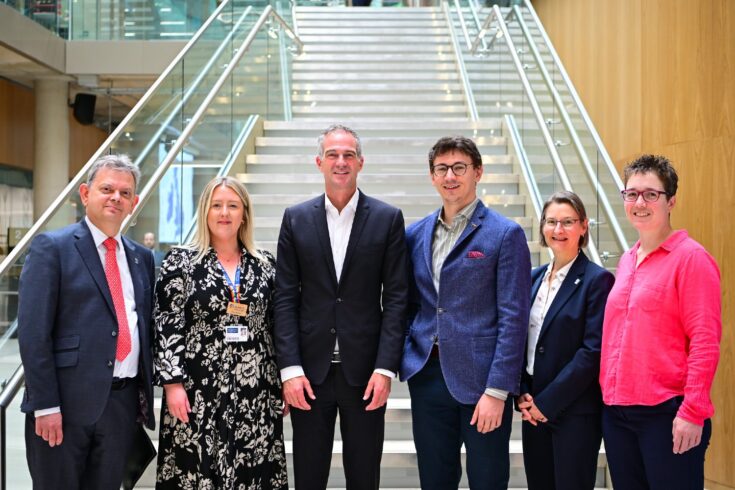Applications include:
- the transformation of early disease diagnosis
- seeing the invisible such as gas leaks and hidden objects
- the creation of a ‘quantum internet’
- realising the potential of quantum computing
- resilient position, navigation and timing systems
Cutting-edge science
Secretary of State for Science, Innovation and Technology Peter Kyle announced the new hubs, which are being supported by a £160 million investment, following a visit to the University of Glasgow, which will host one of the hubs.
He said:
We want to see a future where cutting-edge science improves everyday lives.
That is the vision behind our investment in these new quantum technology hubs, by supporting the deployment of technology that will mean faster diagnoses for diseases, critical infrastructure safe from hostile threats and cleaner energy for us all.
This isn’t just about research; it’s about putting that research to work.
These hubs will bridge the gap between brilliant ideas and practical solutions.
They will not only transform sectors like healthcare and security, but also create a culture of accelerated innovation that helps to grow our economy.
£106 million investment
The hubs are delivered by the Engineering and Physical Sciences Research Council (EPSRC), with a £106 million investment from:
- EPSRC
- Biotechnology and Biological Sciences Research Council (BBSRC)
- Medical Research Council (MRC)
- National Institute for Health and Care Research (NIHR)
The BBSRC, MRC and NIHR investment supports the UK Quantum Biomedical Sensing Research Hub.
Industry collaboration
Industry collaboration is a key element to all of the hubs, which leverage significant cash and in-kind contributions from partners worth more than £54 million.
Quantum technologies harness quantum physics to gain a functionality or performance which is otherwise unattainable, deriving from science which cannot be explained by classical physics such as Newton’s laws of motion or thermodynamics.
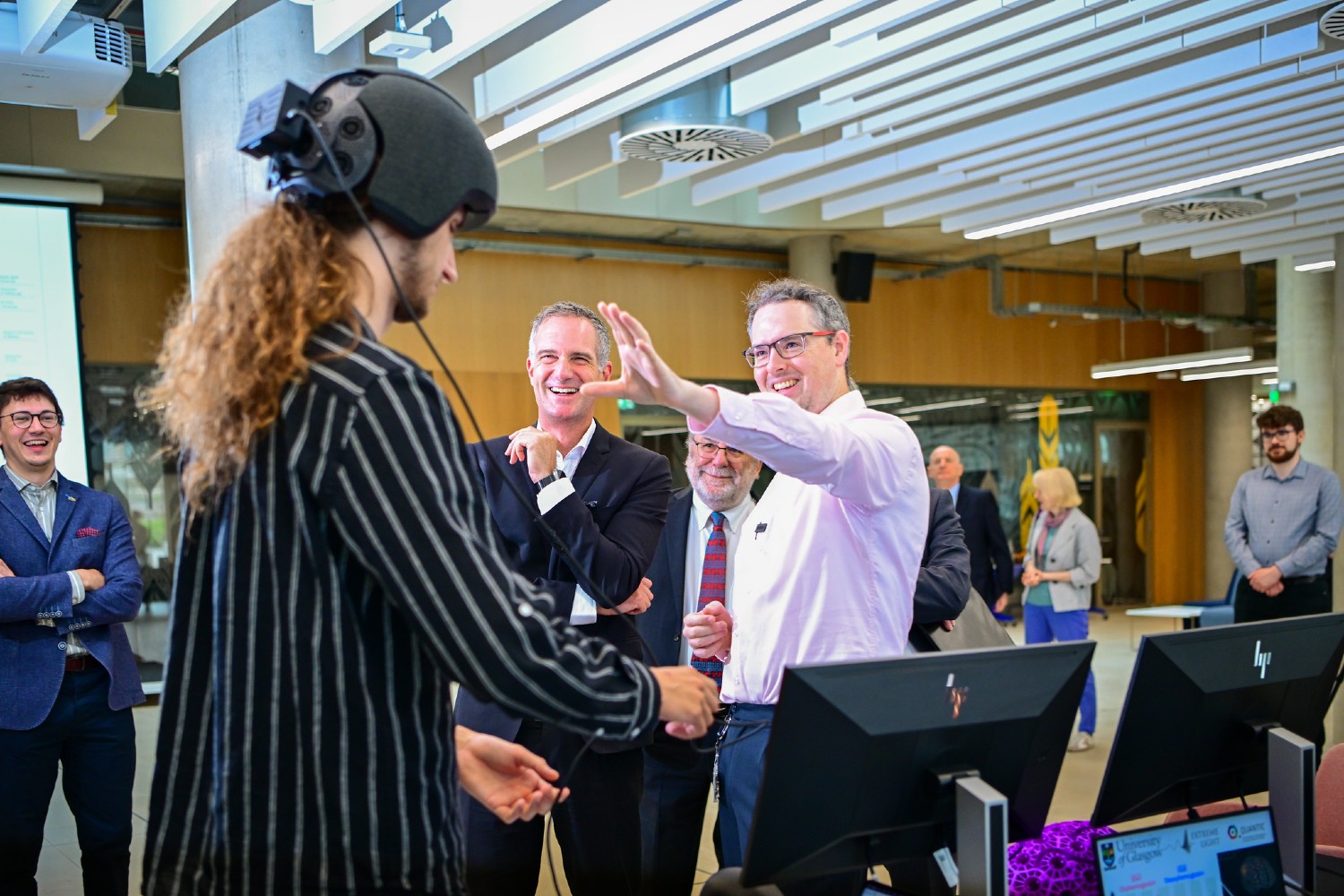
Secretary of State Peter Kyle during his visit to the University of Glasgow. Credit: Alecsandra Dragoi and the Department for Science, Innovation and Technology
Transforming diagnosis
One of the new hubs, led by UCL and the University of Cambridge, aims to use quantum technologies to transform early disease diagnosis.
For example through quantum-enhanced blood tests to diagnose infectious diseases and cancer quickly and cheaply using portable instruments, saving time and reducing costs to the NHS.
A hub led by the University of Birmingham aims to overcome barriers to quantum sensing, imaging and timing to allow us to see the invisible.
This has applications in health such as quantum brain scanners to investigate dementia, and cameras to detect gas leaks and hidden objects.
Secure communications and future computing
A hub led by Heriot-Watt University will undertake underpinning research towards the goal of creating a ‘quantum internet’ formed of globally-interlinked quantum networks connecting multiple quantum computers.
This will be able to produce enormous computational power and will ensure secure access to future quantum computing services, and future-proofed secure communications.
A hub led by the University of Oxford aims to develop the technologies needed for the UK to play a key role in the development of quantum computers.
The quantum computers market is estimated to be worth $1.3 trillion by 2035.
Critical infrastructure
A hub led by the University of Glasgow aims to deliver quantum technologies which will be key for resilient position, navigation and timing systems for use in national security and critical national infrastructure.
This includes improving positioning systems on aircraft to negate any GPS jamming and in submarines to allow them to operate for months without surfacing to reconnect with satellites.
Unparalleled power
EPSRC Executive Chair Professor Charlotte Deane said:
Technologies harnessing quantum properties will provide unparalleled power and capacity for analysis at a molecular level, with truly revolutionary possibilities across everything from healthcare to infrastructure and computing.
The five Quantum Technology Hubs announced today will harness the UK’s expertise to foster innovation, support growth and ensure that we capitalise on the profound opportunities of this transformative technology.
The new hubs continue the work of the UK National Quantum Technologies Programme (UKNQTP).
Now in its 10th year, the partnership of more than £1 billion between government, academia and industry, fast-tracks quantum knowledge from laboratory to wider society and economic impact.
Quantum technology hubs
The Quantum Technology Hubs are:
The UK Quantum Biomedical Sensing Research Hub (Q-BIOMED)
Led by: Professor Rachel McKendry, UCL and Professor Mete Atatüre, University of Cambridge
Host university and partner support (cash and in-kind): £10.8 million
Q-BIOMED aims to transform the future of early disease diagnosis by exploiting emerging advances in quantum sensors capable of detecting cells and molecules, potentially orders of magnitude more sensitively than traditional diagnostic tests.
This includes developing:
- quantum-enhanced blood tests to diagnose infectious diseases and cancer quickly and cheaply using portable instruments
- sensors measuring tiny changes to the magnetic fields in the brain that have the potential to detect early markers of Alzheimer’s disease before symptoms occur
Other research will include quantum-enhanced MRI scans, heart scanners and surgical and treatment interventions for early-stage and hard-to-treat cancers.
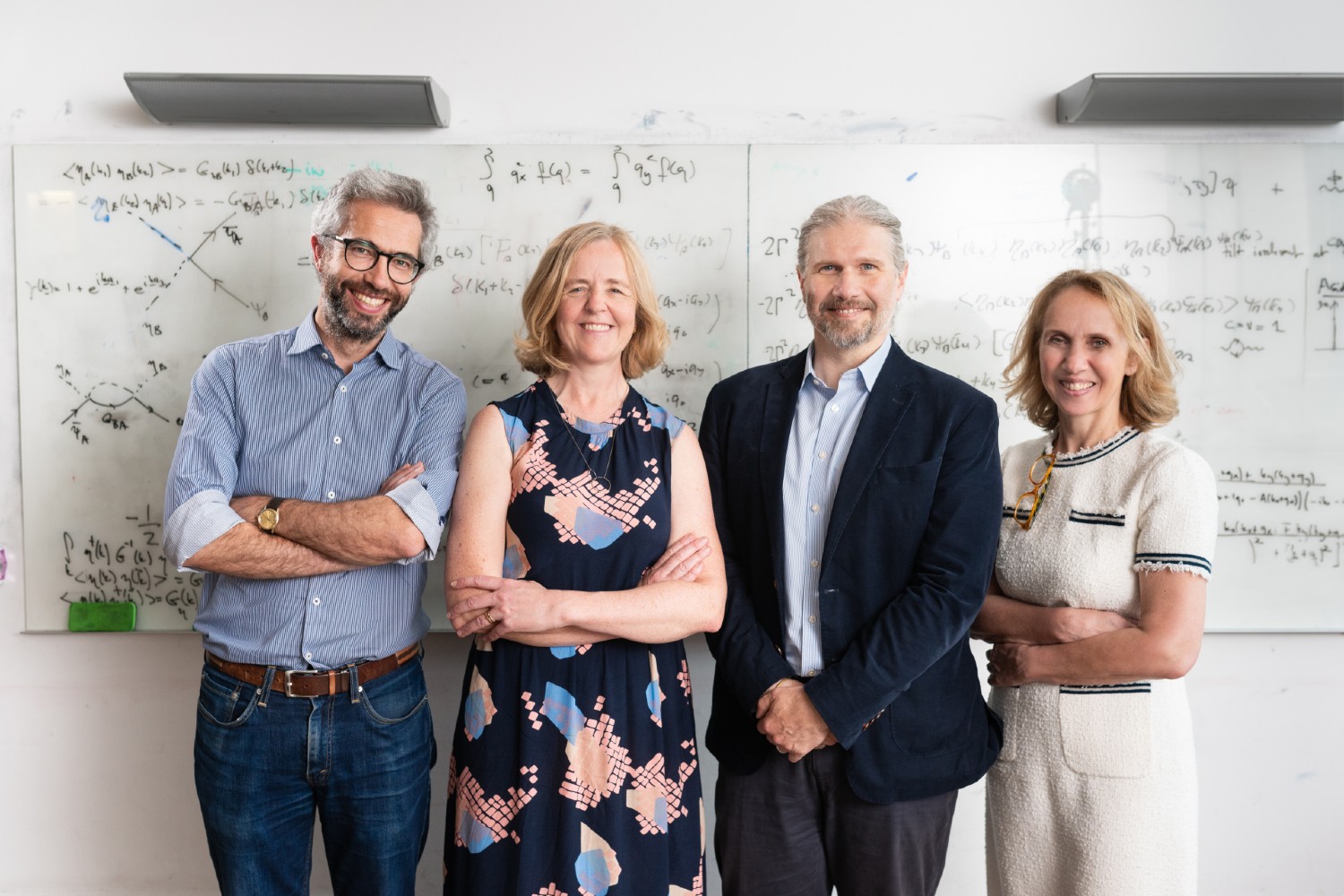
Q-BIOMED is a partnership between experts in quantum technologies and health (left to right): Professor John Morton (Deputy Director, London Centre for Nanotechnology at UCL), Professor Rachel McKendry (Co-Director, London Centre for Nanotechnology and Division of Medicine, UCL), Professor Mete Atatüre (Co-Director, Cavendish Laboratory, Cambridge University) and Professor Eleni Nastouli (UCL Great Ormond Street Institute of Child Health and consultant virologist at UCLH). Credit: James Tye and UCL
UK Quantum Technology Hub in Sensing, Imaging and Timing (QuSIT)
Led by: Professor Michael Holynski, University of Birmingham
Host university and partner support (cash and in-kind): £27.5 million
QuSIT aims to overcome the key research barriers to quantum sensing, imaging and timing being used at scale.
This will allow us to see the invisible, with demonstrations in sectors as diverse as healthcare, infrastructure, transport and security. Examples include:
- quantum brain scanners will enhance investigation of dementia and epilepsy
- quantum microscopy will measure biomarkers for cancer diagnostics
- quantum clocks will enhance radar systems to allow better use of future airspace
- quantum cameras will detect gas leaks and hidden objects
- quantum sensing of gravity and magnetic fields will increase resilience and capacity of critical infrastructure
The hub will also work closely with industry to develop skills and people, creating the leaders of tomorrow.
QuSIT will create a pathway to widespread use and manufacture of quantum technologies, accelerating economic and societal benefits.
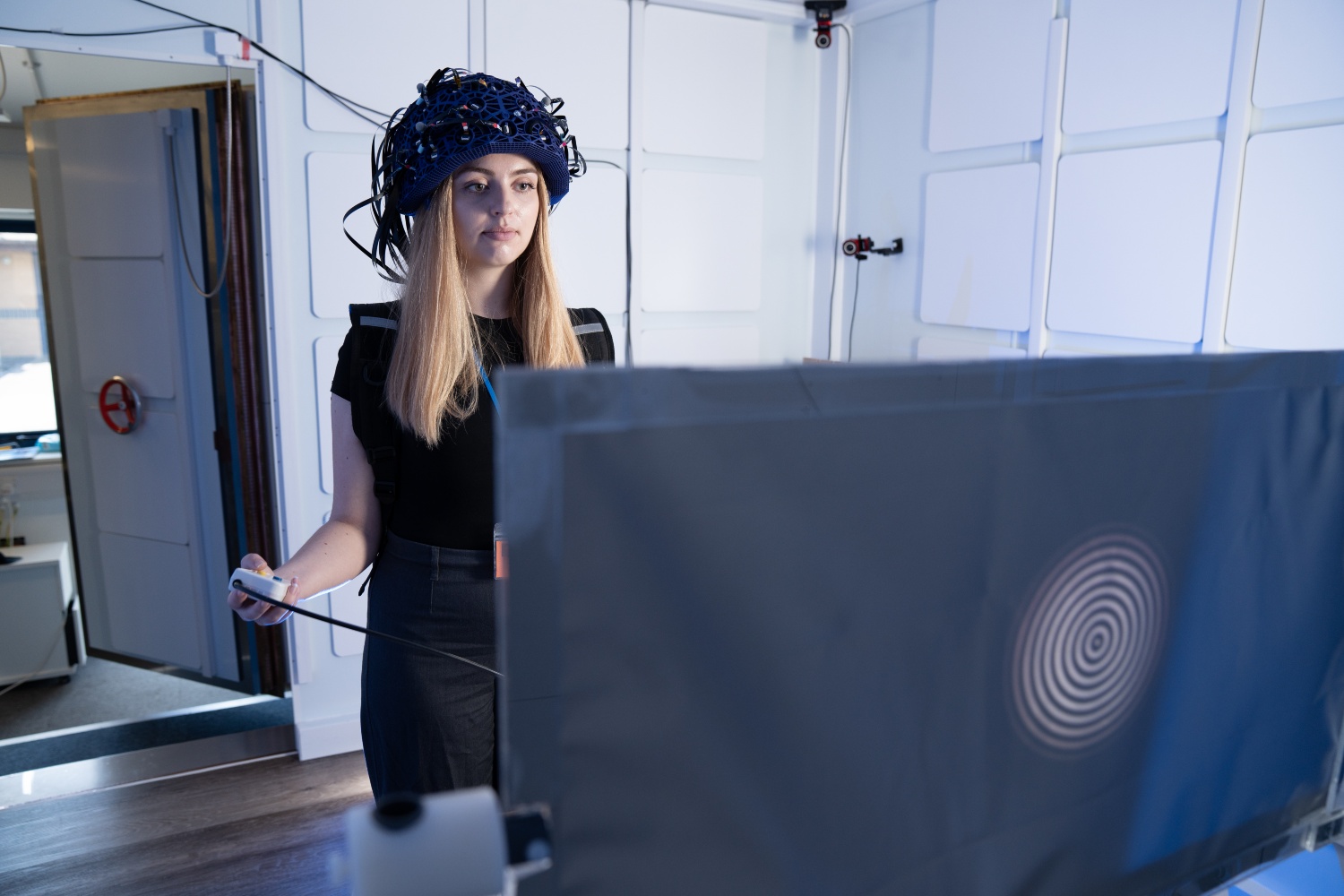
The quantum enabled scanner, which is being commercialised via a UKNQTP spin-out company Cerca Magnetics Limited, allows free movement during a scan. Participants can have brain activity measured while standing, or even walking. This is opening up new possibilities for measuring brain function and dysfunction in a wide variety of disorders, for example movement disorders such as Parkinson’s disease. Credit: QuSIT Hub and University of Nottingham
Integrated Quantum Networks (IQN) Quantum Technology Research Hub
Led by: Professor Gerald Buller, Heriot-Watt University
Host university and partner support (cash and in-kind): £31.7 million
The IQN hub will undertake research towards the ultimate goal of a ‘quantum internet’, globally interlinked quantum networks connecting multiple quantum computers to produce enormous computational power.
The networks will harness the unique properties of quantum physics such as entanglement and quantum memory.
The networks will be designed to ensure secure access to future quantum computing services, as well as future-proof secure quantum communications and distributed quantum sensing applications.
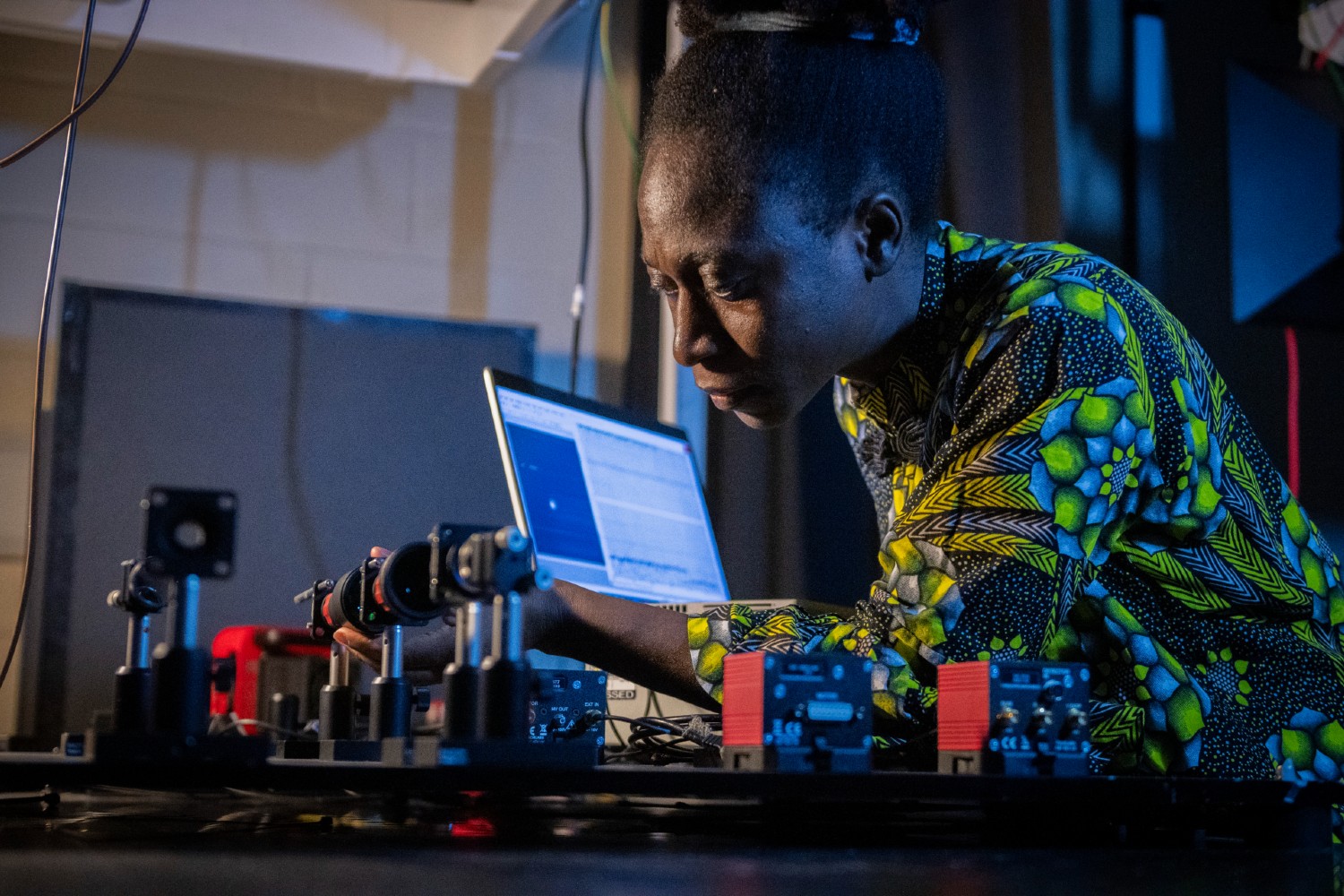
Dr Elizabeth Eso aligning an optical system to experimentally demonstrate a time-bin quantum key distribution system. Credit: Chris Watt Photography
QCI3: Hub for Quantum Computing via Integrated and Interconnected Implementations
Led by: Professor Dominic O’Brien, University of Oxford
Host university and partner support (cash and in-kind): £22.4 million
QCI3 aims to develop the technologies needed for the UK to play a key role in the development of quantum computers, a market estimated to be worth $1.3 trillion by 2030.
The researchers will work closely with industry partners to identify and develop real-world applications of quantum computing, including focusing on design for new materials, chemicals, fluid simulation techniques and machine learning.
For example, the hub will work on the development of quantum machine learning protocols which are key to the development of quantum neural networks with applications in areas such as fraud detection.
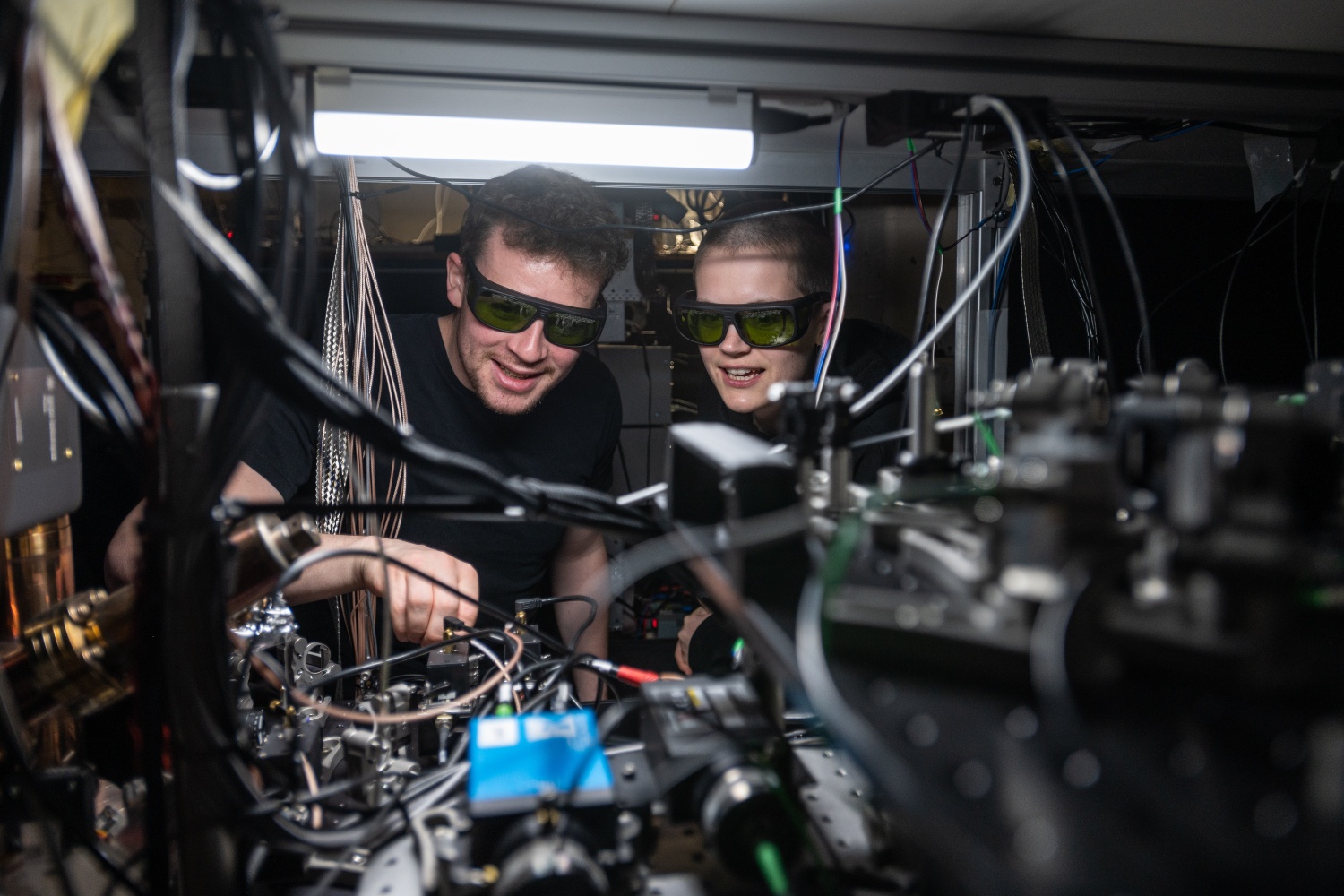
Trapped Ions laboratory at the University of Oxford
The UK Hub for Quantum Enabled Position, Navigation and Timing (QEPNT)
Led by: Professor Douglas Paul, University of Glasgow
Host university and partner support (cash and in-kind): £21.9 million
QEPNT aims to develop quantum technologies which will be key for national security and critical infrastructure and sectors such as aerospace, connected and autonomous vehicles, finance, maritime and agriculture.
These include atomic clocks and LiDAR sensors that use light to measure range. They will provide resilient positioning, navigation and timing.
Smaller, lighter quantum-enabled devices developed at the hub could find new applications in sectors including roads, railways and underground transport, where they could help improve pathfinding systems by replacing current GPS positioning technologies.
They could also enable improved indoor navigation on mobile devices, and upgrade the positioning systems in submarines, allowing them to operate for months without surfacing to reconnect with satellites.
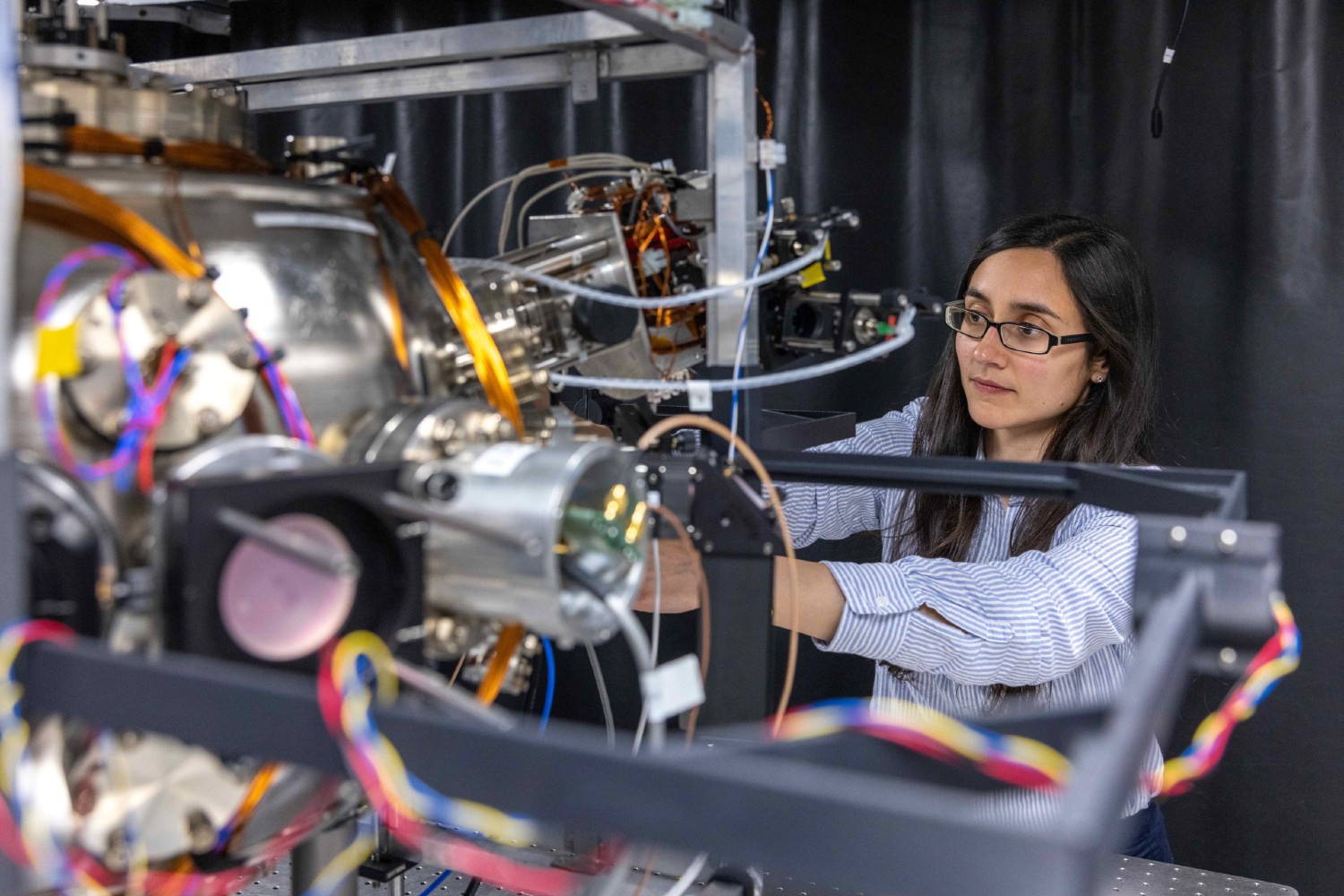
Dr Aisha Kaushik of Imperial College London with a quantum accelerometer developed by Imperial as part of the UK Quantum Technology Programme. Credit: Thomas Angus, Imperial College

